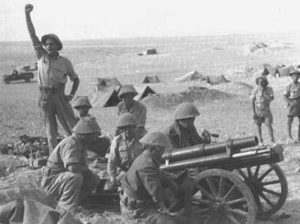Behind the Fighting, Associated Press, San Francisco Chronicle, May 21, 1948.
 Click here to view the original article.
Click here to view the original article.
By DANIEL DE LUCE Associated Press Staff Writer
WITH THE TRANS-JORDAN LEGION IN JERUSALEM, May 20-The Arab counteroffensive in Jerusalem, now in its third day, appears to be an all-out bid for high military and political stakes.
The Arabs seek-
To liquidate the Jewish military potential in Jerusalem, a city holy to three world religions, and place the city under unchallenged Arab guardianship.
To blast away what amounts to a huge Jewish roadblock at the hub of Palestine’s main north-south and east-West highways. This block is in the center of 120 miles of Arab territory stretching from the green plain of Esdraelon in the north to the desert frontier in the south.
If Jewish resistance in Jerusalem collapses soon, the Trans-Jordan Legion obviously would be free to join with the Egyptian army in a drive against the southern perimeter of the Jewish-held coastal plain. Tel Aviv is the bastion on that plain.
FIGHTING SPIRIT
Competent Trans-Jordan military sources do not minimize the desperate fighting spirit of the Haganah, Irgun Zvai Leumi and Stern Forces in Jerusalem, nor the difficulty of street fighting in a city of closely packed buildings with stout stone walls.
According to unofficial Arab estimate, the Jews have 8000 soldiers engaged in the battle of Jerusalem, although the total Jewish population approximates 90,000. The Jewish military force has not yet uncovered any artillery. Its biggest weapon has been the three-inch mortar.
The Jews are isolated from the Jewish state and have been cut off from the normal outside source of Jerusalem’s water supply for 11 days.
The Arabs have a good safe highway at their back, leading across the Jordan valley.
Some puzzlement has been expressed as to why the Jewish high command elected to make Jerusalem the scene of the first big battle of the Arab-Jewish war. Once it became apparent that the Trans-Jordan Legion was bound to encircle Jerusalem, the Jews might possibly have disengaged their military personnel and marched them off to Tel Aviv and trusted the Jewish civilian population to the Trans-Jordan military government, acting under the watchful eye of the Foreign Consular Committee reporting to the United Nations.
AMBITIOUS CAMPAIGN
But reputable neutral sources, as well as Arab officials, say the Jews, not only broke the tentative cease-fire agreement on the eve of the Palestine invasion by the Arab states, but embarked on an ambitious campaign to seize all Jerusalem. The campaign was far advanced by the time the Trans-Jordan Legion activity intervened.
Except for Jerusalem, the entrance of regular Arab armies into the Holy Land has not yet produced more than what diplomats call “police action.”
The Egyptian army is now north of Al Majdal on the coast Inland, it is approaching Hebron, which always has been in Arab hands.
(United Press noted that Egyptian troops, striking up from the south, did not seem eager to attack Jewish positions defending Jaffa. These forces had gone only a few miles north of Gaza, still well within what was labeled as Arab territory under the partition plan.
OIL PROSPECTS
(The bulk of Egyptian strength apparently was being diverted inland. Cairo reports claimed Egyptian troops had taken Beersheba Biblical southern limit of the Holy Land. This would give King Farouk control of the Negev desert area rich in oil prospects, which he wants.)
Iraqi forces have penetrated a small distance west of the Jordan river from captured Gesher, near the Sea of Galilee in the north. There is no confirmation that the Iraqis have yet won control of Beisan on the railway to Afule and Haifa.
This correspondent has received very little news of operations of Syrian and Lebanese forces.



